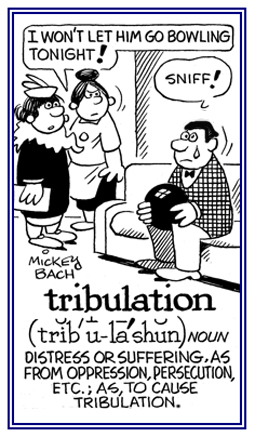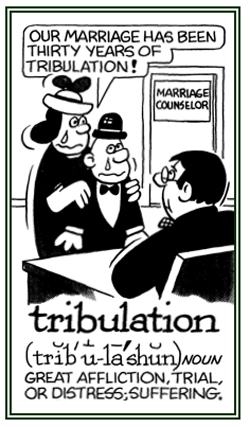2. An experience that tests one's endurance, patience, or religious faith: The illness of Donna's son has been a cause of great tribulation for her and her husband.
3. Etymology: from Old French tribulacion (12th century), from Late Latin tribulationem, tribulatio, "distress, trouble, affliction"; from tribulatus, tribulare, "to oppress, afflict"; a figurative use by Christian writers of Latin tribulare "to press"; also possibly, "to thresh out grain;" from tribulum "threshing sledge", from stem of terere, "to rub" + -bulum, a suffix forming names of tools.
Originally tribulation came from Greek; then through Latin, "to press; affliction"; and by extension, "distress, great trial", or "affliction".
The Roman tribulum was a sledge consisting of a wooden block studded with sharp pieces of flint or iron teeth. It was used to bring force and pressure against wheat in grinding out grain.
The machine suggested the way trouble grinds people down and oppresses them, tribulations becoming another word for troubles and afflictions. The word is first recorded in English in 1330.
The Romans ground out their corn (grain) with a heavy roller, mentioned in Vergil’s Georgics among agricultural instruments: the tribulum, a diminutive noun, from tritere, trit-, "to rub", from Greek tribein, "to rub".
"Being ground under and pressed out" made an excellent metaphor to express the trials and tribulations of the early Christians.


